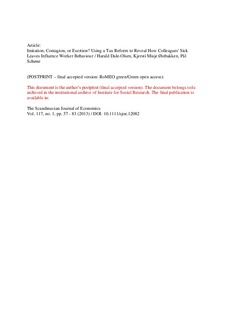| dc.contributor.author | Dale-Olsen, Harald | |
| dc.contributor.author | Østbakken, Kjersti Misje | |
| dc.contributor.author | Schøne, Pål | |
| dc.date.accessioned | 2017-10-23T12:41:32Z | |
| dc.date.available | 2017-10-23T12:41:32Z | |
| dc.date.created | 2014-10-03T12:45:19Z | |
| dc.date.issued | 2015 | |
| dc.identifier.citation | The Scandinavian Journal of Economics. 2015, 117 (1), 57-83. | |
| dc.identifier.issn | 0347-0520 | |
| dc.identifier.uri | http://hdl.handle.net/11250/2461477 | |
| dc.description.abstract | We analyse the social interaction effects in sick-leave behaviour in the workplace, using high-quality Norwegian matched employer–employee data with detailed individual information on sick leaves during the 2004–2006 period. We find that social interaction effects in sick-leave behaviour in the workplace do exist, and that the effects are noticeable in size. The strong relationship between the sick-leave rates among colleagues is not solely the result of contagious diseases, nor is it caused by improved informational quality or by the increased workload for the non-absent workers. Evidence supports the existence of reciprocal worker behaviour that is unrelated to joint leisure-seeking activities. | |
| dc.language.iso | eng | |
| dc.title | Imitation, Contagion, or Exertion? Using a Tax Reform to Reveal How Colleagues' Sick Leaves Influence Worker Behaviour | |
| dc.type | Peer reviewed | |
| dc.type | Journal article | |
| dc.description.version | acceptedVersion | |
| dc.source.pagenumber | 57-83 | |
| dc.source.volume | 117 | |
| dc.source.journal | The Scandinavian Journal of Economics | |
| dc.source.issue | 1 | |
| dc.identifier.doi | 10.1111/sjoe.12082 | |
| dc.identifier.cristin | 1161110 | |
| cristin.unitcode | 7437,0,0,0 | |
| cristin.unitname | Institutt for samfunnsforskning | |
| cristin.ispublished | true | |
| cristin.fulltext | postprint | |
| cristin.qualitycode | 2 | |
